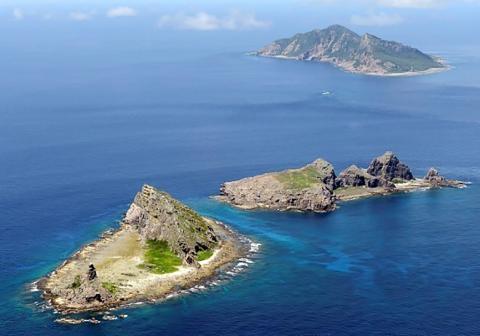The Ministry of Foreign Affairs yesterday reasserted Taiwan’s sovereignty over the Diaoyutai Islands (釣魚台) in the disputed East China Sea, after the Japanese government expedited a plan to include Japan’s territorial claims over the island chain in its school curriculum.
The Japanese Ministry of Education, Culture, Sports, Science and Technology on Tuesday announced that it is moving up implementation of its “national territory education” curriculum from 2022 to next year, according to a Kyodo News report.
Japanese high-school students are to be taught about the legitimacy of Japan’s territorial claims over several disputed islands, including Diaoyutai, as well as islets in the Sea of Japan known as Takeshima in Japan and Dokdo in South Korea.

Photo: Reuters
“The government has maintained a consistent stance on the issue, which is that the Diaoyutai Islands are part of the Republic of China’s territory,” ministry spokesman Andrew Lee (李憲章) said in a press release.
The reality that Taiwan enjoys sovereignty over the archipelago is not going to be changed by any country’s decision to categorize it as their own territory in school textbooks, Lee said.
The Taiwanese government has always advocated for a peaceful solution to territorial disputes to avoid situations in which a concerned party’s unilateral actions lead to heightened tensions in the region, Lee said.
The Diaoyutais, about 120 nautical miles (222.2km) northeast of Taipei, are also claimed by China.
To prevent tensions in the region from escalating, then-president Ma Ying-jeou (馬英九) in 2012 proposed the East China Sea peace initiative while visiting Pengjia Islet (彭佳嶼), about 56km north of Taiwan proper.
The initiative calls for all parties to take action to reduce tensions, abide by international law, ensure the freedom of navigation and overflight, and seek a peaceful resolution to disputes.
After taking office in 2016, President Tsai Ing-wen (蔡英文) has adopted a similar approach, reiterating Taiwan’s sovereignty over Diaoyutais while calling for a peaceful resolution to territorial disputes.

The High Prosecutors’ Office yesterday withdrew an appeal against the acquittal of a former bank manager 22 years after his death, marking Taiwan’s first instance of prosecutors rendering posthumous justice to a wrongfully convicted defendant. Chu Ching-en (諸慶恩) — formerly a manager at the Taipei branch of BNP Paribas — was in 1999 accused by Weng Mao-chung (翁茂鍾), then-president of Chia Her Industrial Co, of forging a request for a fixed deposit of US$10 million by I-Hwa Industrial Co, a subsidiary of Chia Her, which was used as collateral. Chu was ruled not guilty in the first trial, but was found guilty

‘DENIAL DEFENSE’: The US would increase its military presence with uncrewed ships, and submarines, while boosting defense in the Indo-Pacific, a Pete Hegseth memo said The US is reorienting its military strategy to focus primarily on deterring a potential Chinese invasion of Taiwan, a memo signed by US Secretary of Defense Pete Hegseth showed. The memo also called on Taiwan to increase its defense spending. The document, known as the “Interim National Defense Strategic Guidance,” was distributed this month and detailed the national defense plans of US President Donald Trump’s administration, an article in the Washington Post said on Saturday. It outlines how the US can prepare for a potential war with China and defend itself from threats in the “near abroad,” including Greenland and the Panama

DEADLOCK: As the commission is unable to forum a quorum to review license renewal applications, the channel operators are not at fault and can air past their license date The National Communications Commission (NCC) yesterday said that the Public Television Service (PTS) and 36 other television and radio broadcasters could continue airing, despite the commission’s inability to meet a quorum to review their license renewal applications. The licenses of PTS and the other channels are set to expire between this month and June. The National Communications Commission Organization Act (國家通訊傳播委員會組織法) stipulates that the commission must meet the mandated quorum of four to hold a valid meeting. The seven-member commission currently has only three commissioners. “We have informed the channel operators of the progress we have made in reviewing their license renewal applications, and

A wild live dugong was found in Taiwan for the first time in 88 years, after it was accidentally caught by a fisher’s net on Tuesday in Yilan County’s Fenniaolin (粉鳥林). This is the first sighting of the species in Taiwan since 1937, having already been considered “extinct” in the country and considered as “vulnerable” by the International Union for Conservation of Nature. A fisher surnamed Chen (陳) went to Fenniaolin to collect the fish in his netting, but instead caught a 3m long, 500kg dugong. The fisher released the animal back into the wild, not realizing it was an endangered species at